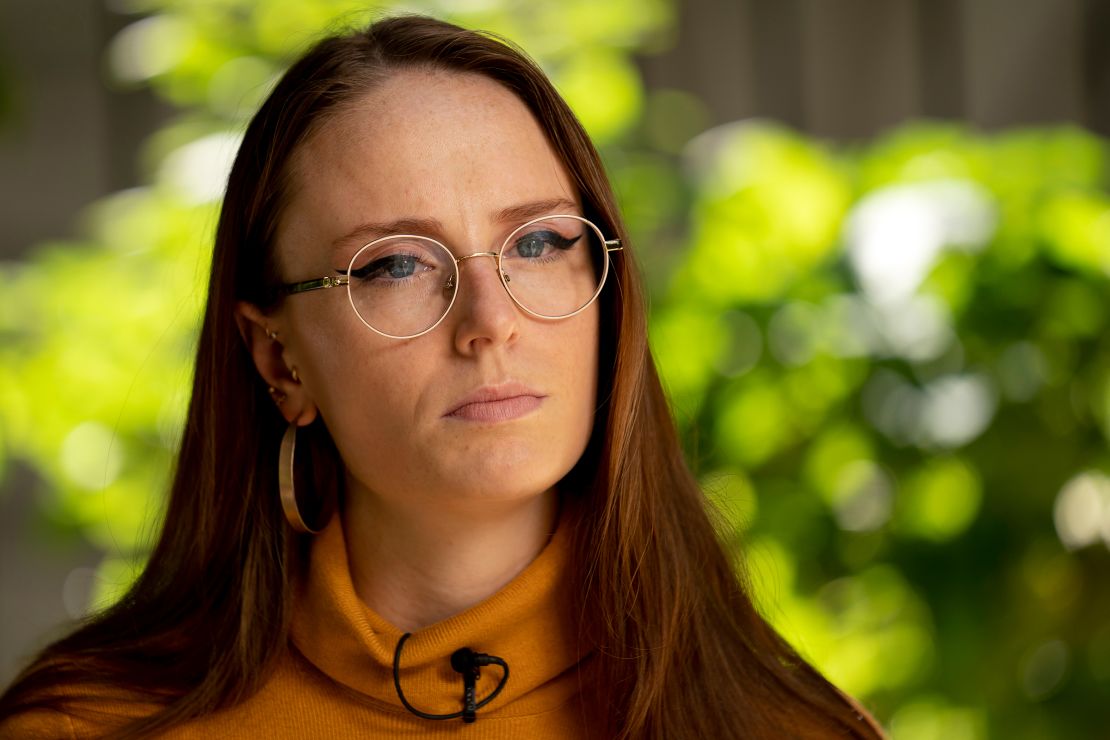CNN
—
In the summer of 2023, Ana Liss sat in a law firm conference room in Rochester, New York, to be deposed — again. This time the ordeal lasted more than eight hours, she recalls, with a brief lunch break in the middle of the day. She was questioned repeatedly by Andrew Cuomo’s lawyer about her time working for New York state and her allegations of misconduct against the former governor.
Liss made the unusual — and inadvisable — decision that day to not have her lawyer present for the deposition.
“I tried to MacGyver my way through it,” she told CNN in a recent interview. “I tried to muddle through. That’s not the best tactic, but it’s a way to save money.”
Liss was one of the multiple aides who accused then-Gov. Cuomo of misconduct in 2021. She described the Capitol’s Executive Chamber as “a toxic, verbally abusive, retaliatory workplace, especially for young women like myself” — allegations that Cuomo and his top aides deny. Even though Liss never sued Cuomo — she said at the time she decided to speak out to show support to other accusers — she has nevertheless been saddled with legal bills to the tune of around $30,000 so far, she said.
Those bills have been related to a New York attorney general’s investigation into the allegations she and others leveled against Cuomo, in which Liss was first deposed, as well as a lawsuit that a state trooper launched against Cuomo that led to Liss’ second deposition in 2023. A mother to two young kids now working on economic development in upstate New York, Liss is determined to spare her family thousands of additional dollars in legal fees.
Cuomo, however, does not share that financial concern: His legal fees for defending against lawsuits brought by several former employees continue to be covered largely by New York taxpayers four years after he announced his resignation as governor.
As of early July, the state had expensed $20.5 million for the legal defense of Cuomo and several officials who worked in the executive chamber from three ex-employees who have sued them: Brittany Commisso, an anonymous state trooper known as “Trooper 1” and Charlotte Bennett.

That eye-popping figure, provided to CNN by the New York state comptroller’s office, is separate from an additional $11.7 million in fees footed by taxpayers for legal bills related to multiple scandals Cuomo confronted at the end of his tenure as governor. Those include sexual harassment allegations against Cuomo that were investigated by the New York attorney general; his controversial handling of the Covid-19 crisis; and the potential impeachment proceedings he faced before his resignation in August 2021.
Cuomo’s legal defense has continued as he attempted to make a political comeback. He suffered a stunning defeat in the New York City mayoral Democratic primary contest last month, losing to Zohran Mamdani, a progressive democratic socialist. He will still appear on the “Fight & Deliver” ballot line in November.
CNN reviewed hundreds of pages of documents related to the lawsuits brought by Commisso, Trooper 1 and Bennett against Cuomo, and interviewed plaintiffs’ lawyers, legal experts, several of Cuomo’s accusers and top Cuomo advisers.
Legal experts told CNN that Cuomo’s defense team has at times deployed aggressive and unconventional tactics that appear intended to slow down legal proceedings. They warned the tactics are having the effect of intimidating and harassing individuals who have spoken out against Cuomo or could do so in the future. And that costly strategy, the experts said, has been made easier because Cuomo’s legal fees in these cases are being covered by New York taxpayer dollars.
The defense strategy includes expansive discovery efforts seeking accusers’ medical records — including gynecology, optometry and family therapy records of one plaintiff. Cuomo’s legal team has also sought to probe third-party accusers’ romantic histories and past alleged experiences of sexual trauma, as well as their communications with members of the media. It has also made deposition requests for third parties even if they were previously deposed as part of the New York attorney general’s investigation and said they have no insights into plaintiffs’ allegations.
“Roping in every possible party and subjecting them to extensive and invasive interrogatories and depositions and trying to subpoena all sorts of records from them: Does that conduct have a reasonable purpose other than to delay or prolong the resolution of the litigation?” said Heidi Li Feldman, a professor at Georgetown University Law Center who studies legal ethics. “I am suspicious whether this has any purpose other than to delay or prolong the litigation.”
Cuomo’s advisers and lawyers are defiant and dismiss those critiques. They categorically deny all allegations of sexual harassment leveled against the former governor and told CNN he will not settle. They acknowledge that the ongoing lawsuits have been expensive and protracted but pin the blame on who they describe as cash-hungry ex-employees who decided to sue him, as well as what they see as a political witch hunt orchestrated by New York Attorney General Letitia James.
“The Attorney General bears direct responsibility for this entire mess,” Cuomo’s top lawyer, Rita Glavin, said in a statement to CNN. Glavin described the AG’s probe as a “shoddy investigation and inaccurate report to pave the way for her own political campaign for Governor” and also dismissed a separate investigation commissioned by the New York State Assembly as an “equally flawed tag-along report.”
Those “now-discredited political reports spawned civil lawsuits because plaintiffs hoped to use the reports to force quick seven-figure settlements,” Glavin said.

CNN’s examination of the lawsuits leveled against Cuomo found that his legal team’s tactics have drawn a range of responses in court. At times the team was rebuked by a judge in one lawsuit for being too extensive; in other instances, it received the green light from that judge to proceed with certain discovery efforts.
Meanwhile, some of Cuomo’s accusers say they are desperate to finish this chapter of their lives. The scope of Cuomo’s discovery efforts has made some of them fearful about speaking out in public or communicating in any way with the other accusers.
Jayne Ressler, an associate professor of law at Columbia Law School who is an expert on civil procedure, expressed concern that Cuomo’s legal strategy is prolonging trauma for some of Cuomo’s accusers while costing him little financially.
“For him, it’s Monopoly money. So it doesn’t matter. It just shows how unfair the political process is where he has all this sort of play money to spend on defending himself,” Ressler said. “It’s just a double victimization, and it really just shows you that justice is not free.”
A New York attorney general’s office investigation, a report commissioned by the New York State Assembly and a US Justice Department probe concluded that as governor, Cuomo had sexually harassed around a dozen women. One of those women was a state trooper who had been assigned to be on Cuomo’s detail, known as Trooper 1.
Trooper 1 alleged that she was a victim of repeated unwanted sexual advances and touches from Cuomo, including hugs, kisses and inappropriate questions about her sex life. She filed a lawsuit in February 2022 against Cuomo, his top aide Melissa DeRosa, his longtime spokesperson Richard Azzopardi, and the New York State Police.
(Cuomo said in his resignation announcement speech that he did not remember having touched the trooper’s back and stomach, as she alleged. “But, if she said I did it, I believe her,” Cuomo said, adding that when he walks by, he often touches troopers who work with him — male or female — as a way of saying: “I see you, I appreciate you and I thank you.”)
More than three years later, a trial date has not been set. CNN’s examination of the legal proceedings so far reveals Cuomo’s defense team has made expansive discovery requests targeting not only the plaintiff but the other women who separately accused him of misconduct. Cuomo’s lawyers had initially sought around 73,000 unredacted documents, including internal office memos, communications between the attorney general’s office and any attorney for witnesses included in their investigation, and interviews with subjects listed in Trooper 1’s complaint from the AG’s investigation.
The request drew a reprimand from Judge Taryn Merkl, who called it “extraordinarily broad” and warned Cuomo’s defense team that “generalizations are not going to work in terms of establishing relevance.” Merkl denied some parts of the Cuomo defense team’s discovery efforts and granted others.
Cuomo’s lawyers argued in a letter to the court in 2022 that because Trooper 1’s amended complaint included allegations about Cuomo from the 10 other women from the AG’s investigation, it “necessitates the defense deposing those women to refute the allegations.”
When asked for comment, a spokesperson for the AG’s office pointed to the tens of thousands of exhibits and hundreds of hours of depositions — most of which are unredacted — related to the Cuomo investigation that are publicly available on the office’s website.
Some of Cuomo’s efforts have at times prompted the judge in Trooper 1’s case to warn the defense to tread carefully. While the judge allowed in that case for Cuomo’s team to depose Bennett, Cuomo’s lawyers were ordered to submit question topics to Bennett two weeks in advance. The judge further warned Cuomo’s lawyers that questions about Bennett’s sexual past must also be submitted in advance and: “To the extent that Defendant Cuomo seeks to inquire into the witness’s prior sexual behavior, the ‘probative value [of that evidence must] substantially outweigh the danger of harm to any victim and of unfair prejudice to any party.’”
As for the trooper, Cuomo’s team fought to obtain text messages between the plaintiff and her former fiancé — a request that the court denied. Trooper 1 argued that the texts were “non-public, sensitive and confidential,” and were never “intended for the public.” Cuomo’s lawyers also sought a wide range of past medical records for the trooper and initially requested seven hours to depose the plaintiff. The court allowed Trooper 1’s legal team to redact communications with counsel and medical providers unrelated to any claims for Trooper 1’s emotional distress claim and granted some of those records to be filed under seal, according to court documents.
In court documents, Cuomo’s team has rejected allegations that their discovery efforts amount to harassment, saying that all of their subpoenas “seek relevant information” and are “not harassing as a matter of law.” Glavin separately told CNN that those requests were relevant because the trooper communicated with her ex-fiancé about Cuomo and her allegations against him, and that Trooper 1’s claims of emotional distress could have been caused by her relationship with the former fiancé.
Valdi Licul, one of the attorneys representing Trooper 1, said given that multiple investigating bodies have concluded that Cuomo had created a sexually hostile work environment for numerous women, his ongoing legal defense amounts to additional harassment.
“With no viable defense, Cuomo has chosen to waste tens of millions of taxpayer dollars to weaponize the legal process to attack his victims,” Licul said.
The Cuomo team’s legal strategy has taken mental and financial tolls on the plaintiffs and other ex-employees who have accused him of misconduct.
In December, Bennett dropped her lawsuit against Cuomo after his lawyers waged an aggressive discovery strategy that sought, among other things, records from her gynecologist, optometrist and family therapist. The discovery process wasn’t completed before Bennett dropped her lawsuit.
In a statement at the time, Bennett described the two-year ordeal as “extraordinarily painful” and acknowledged that it had driven her to the darkest of places. “I’ve many times believed that I’d be better off dead than endure more of his litigation abuse, which has caused extraordinary pain and expense to my family and friends,” she said. “I desperately need to live my life. That’s the choice I am making today.”

Glavin said that all requests for Bennett’s medical records were “pro forma” and “made at the direction of a psychiatric expert for the case and was the result of the massive monetary damages Ms. Bennett was claiming.”
“That is why Ms. Bennett did not oppose this routine discovery request in court — only in the press,” Glavin said. Cuomo advisers also insist that Bennett only dropped her federal lawsuit because she didn’t want to be deposed under oath.
Just days after Bennett dropped that lawsuit, Cuomo filed notice of his intent to sue Bennett for defamation — a remarkable turn from his resignation speech, in which he said “I deeply, deeply apologize” to anyone he had offended.
Meanwhile, earlier this year, Bennett and the state of New York agreed to a $450,000 settlement in a separate lawsuit brought by Bennett that claimed state officials didn’t do enough to protect her from Cuomo’s alleged inappropriate behavior. The terms said Bennett would receive $100,000 and her lawyers around $350,000 for reimbursed fees and other legal costs, according to the New York Times.
Lindsey Boylan, a former Cuomo aide who was the first woman to publicly accuse him of sexual harassment, is not suing her former boss. Yet she remains tangled up in a web of discovery requests from Cuomo’s lawyers — including multiple subpoenas issued in the Trooper 1 case, even though Boylan says she has no idea who the trooper is. Boylan said her own legal bills have so far been in the millions of dollars. She was also subpoenaed in Bennett’s case.
“Being forced to hire attorneys to simply prevent the former governor of New York from abusing you legally with taxpayer money is, is a sentence that you kind of can’t really believe exists in the wild, right?” she said in an interview with CNN.
Attorney Marianne Wang represents Commisso, along with two others who have accused Cuomo of harassment — Virginia Limmiatis and Alyssa McGrath. Wang said she believes Cuomo’s taxpayer-funded litigation tactics have been “punitive and overbroad.”
Some watchdog groups and victims’ advocates are urging New York State Comptroller Thomas DiNapoli to stop covering some of Cuomo’s legal fees.
They have pointed to language in the relevant section of New York state law that says “reasonable attorneys’ fees and litigation expenses” would be covered by the state.
“The comptroller, under the statute, is required to provide a necessary and reasonable defense. But that doesn’t mean a blank check to a defendant who seems to have no compunction of using the litigation as a bludgeon,” Susan Lerner, executive director of Common Cause New York and a former litigator, said in an interview.
Lerner added: “It’s very possible to assert a vigorous defense without running up these sort of fees. … It really indicates, frankly, I think, an abuse of the system.”
Jennifer Freeman, spokesperson for DiNapoli, said the comptroller is simply following the law by covering Cuomo’s legal fees.
“The AG’s office approved Andrew Cuomo to have his costs and some of his staff covered,” Freeman said. “Once they approve, it is our job to pay the bills as the state’s accountant.”
On whether the comptroller should and could question the Cuomo team’s legal conduct and whether it might be creating unnecessary and unreasonable legal fees, Freeman said any such determination must be made by the courts or the state’s attorney general: “We are not the state’s lawyers,” she said.
The attorney general’s office declined to comment.

